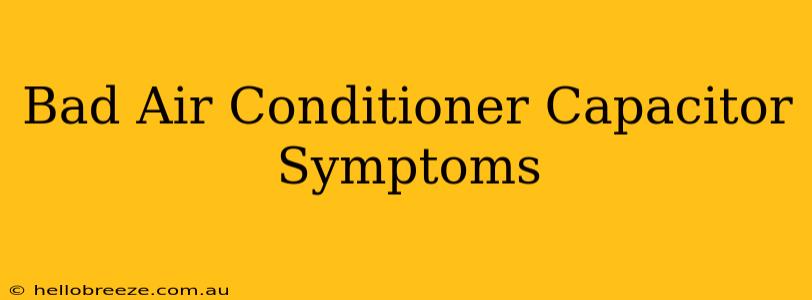Is your air conditioner struggling to keep up with the summer heat? One common culprit behind AC woes is a failing capacitor. Understanding the symptoms of a bad air conditioner capacitor is crucial for timely repairs and avoiding costly breakdowns. This guide will help you identify the signs, understand the cause, and know when it's time to call in a professional.
Recognizing the Telltale Signs of a Failing Capacitor
A capacitor in your AC unit is an essential component responsible for starting the compressor and fan motor. When it fails, the system's performance suffers drastically. Here are some key symptoms indicating a problematic capacitor:
1. AC Unit Won't Turn On
This is perhaps the most obvious sign. If your air conditioner refuses to start at all, a faulty capacitor is a prime suspect. The capacitor provides the initial surge of power needed to get the compressor running. Without it, the system simply won't engage.
2. Compressor Doesn't Start
Even if the fan is running, a non-functioning compressor points towards capacitor issues. The compressor is the heart of your AC, responsible for cooling the refrigerant. A bad capacitor prevents it from starting, leaving you with no cold air despite the fan's operation.
3. Humming Noise from the AC Unit
A persistent humming sound emanating from your AC unit, especially when attempting to turn it on, is a strong indicator of a failing capacitor. This humming usually signifies the capacitor is struggling to provide the necessary power surge. It's important to note: this humming is distinct from the normal operation sounds of your AC unit.
4. Intermittent Operation
Does your AC seem to work sometimes and then completely fail at others? This intermittent behavior can be another symptom of a failing capacitor. The capacitor's ability to store and release electrical charge deteriorates as it ages, leading to inconsistent performance. It might work for a few minutes and then shut down, giving the impression of a more complex problem.
5. Overheating
While a failing capacitor might seem like a purely electrical problem, it can have thermal consequences. The added strain on the system from the capacitor's malfunction can lead to overheating of components, potentially causing further damage.
Why Capacitors Fail
Capacitors are electromechanical devices, and like all components, they have a limited lifespan. Several factors can contribute to premature failure:
- Age: As capacitors age, their ability to store electrical charge decreases. This is a natural process of wear and tear.
- Heat: Excessive heat significantly reduces the lifespan of capacitors.
- Voltage Spikes: Power surges or voltage fluctuations can damage the capacitor's internal components.
- Manufacturing Defects: In rare cases, capacitors can fail due to manufacturing defects.
When to Call a Professional
While some simple electrical tasks are DIY-friendly, capacitor replacement often requires specialized knowledge and safety precautions. Working with electrical components can be dangerous, so it's best to call a qualified HVAC technician for repairs if you suspect a bad air conditioner capacitor. They have the expertise to diagnose the problem accurately and safely replace the capacitor. Attempting a repair yourself without the proper knowledge can lead to electrical shock or further damage to your air conditioning system.
Remember, a functioning air conditioner is crucial for comfort and health, especially during the hottest months. Addressing capacitor issues promptly prevents costly breakdowns and ensures your home stays cool and comfortable all season long.

